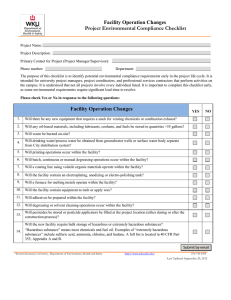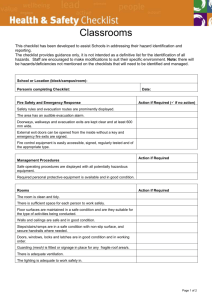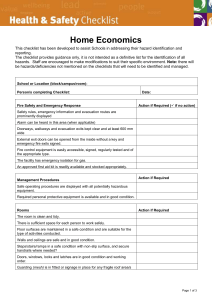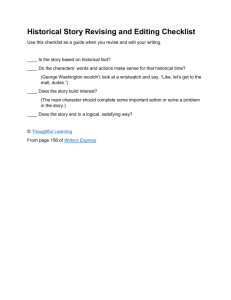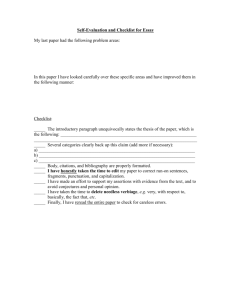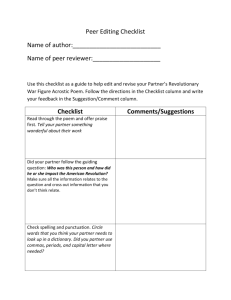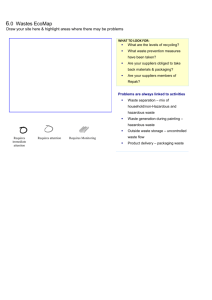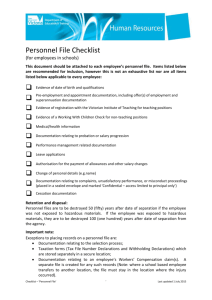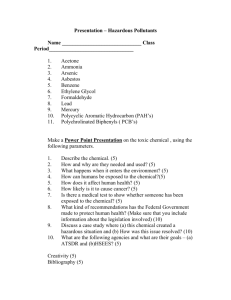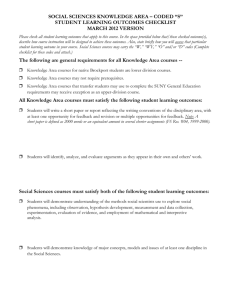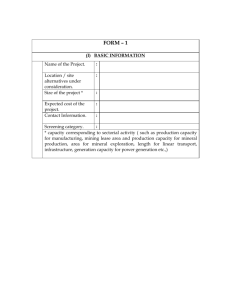02_Walkabout checklist (Workshop)
advertisement
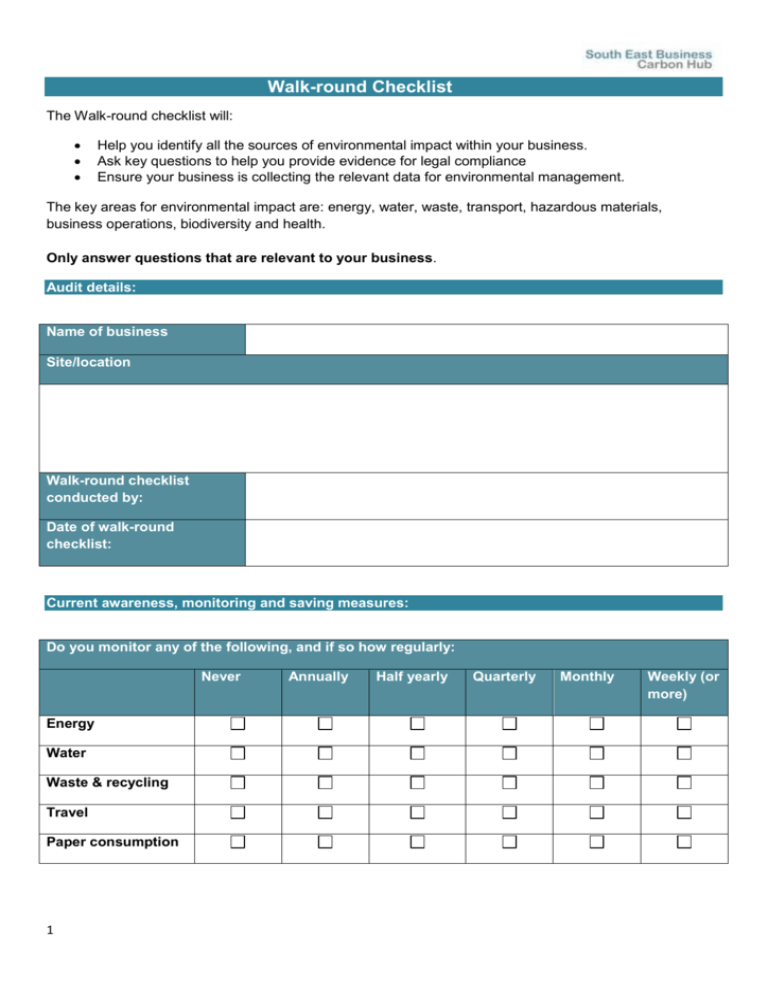
Walk-round Checklist The Walk-round checklist will: Help you identify all the sources of environmental impact within your business. Ask key questions to help you provide evidence for legal compliance Ensure your business is collecting the relevant data for environmental management. The key areas for environmental impact are: energy, water, waste, transport, hazardous materials, business operations, biodiversity and health. Only answer questions that are relevant to your business. Audit details: Name of business Site/location Walk-round checklist conducted by: Date of walk-round checklist: Current awareness, monitoring and saving measures: Do you monitor any of the following, and if so how regularly: Never Energy Water Waste & recycling Travel Paper consumption 1 Annually Half yearly Quarterly Monthly Weekly (or more) Do you raise employee awareness to minimise use/consumption of any of the following: Energy Water Waste Paper use Travel Procurement Hazardous materials Have you implemented any saving measures in the following areas: energy saving light bulbs, insulation, dual flush toilets, timers etc. Yes If yes, what measures: Energy Water Waste Travel Paper Procurement Have you received any grants/loans for implementation of saving measures? Yes No 2 If yes, please specify: Current management of your environment: Do you have an environmental policy? Yes If yes, what are the targets/objectives: No If yes, how is your environmental policy communicated: What training (if any) has been given to employees to make them aware of their environmental responsibilities? Trained If trained, please provide details: None Do you carry out environmental audits? If yes, how often: Annually Half yearly Yes Quarterly No Monthly Does your business release any pollutant(s) into the air, land, or water? Weekly Yes No (e.g. exhaust fumes, chemicals into groundwater). If yes, what measures have you taken to minimise the pollutant(s) impact: Do you have an environmental permit to do so? 3 Yes No Have you ever received complaints from neighbours about your business activities? (e.g. too much noise, smoke, health & safety). Yes No If yes, specify: Do you have a business continuity plan? Yes No Energy: Tick the main types of energy used by your business? Electricity Gas Heating oil Wood pellets Propane Petrol Diesel LPG Gas oil Industrial Domestic Naphtha Lubricants Coking Aviation fuel Aviation spirits Petroleum coke Refinery fuels Onsite renewable energy Specify: Other Specify: Specify: Water: Do you discharge any materials other than fresh water, into the following: Surface water systems Ground water systems *materials other than uncontaminated water and sewage. 4 Public sewers * Specialist waste: Do you store or dispose of any of the following: Asbestos Chemical wastes Brake fluid Printer toner, Healthcare wastes, e.g. syringes, drugs and dressings, Electrical equipment containing hazardous components such as cathode ray tubes or lead solder, e.g. computer monitors, televisions, Fluorescent light tubes, e.g. energy-saving light bulbs, Lead-acid batteries, Oils, including oily sludges (not cooking oil), Pesticides, Solvents, e.g. aerosols, Fuels & oils. Do you use/store any hazardous materials on site? Yes Please specify materials: How do you control the risks from hazardous materials: No Please go to next question Waste: Do you do any of the following: Audit/record waste Recycle materials Reuse materials Recover materials Use authorised waste carriers Check authorisation certificates Require a license for disposal Compost waste Have an EA permit Use the table below to help identify your waste streams: 5 Waste description Collection method: by contractor, taken home, part of general waste Container type Collection frequency Main contractor: (e.g.) Viridor, Biffa, District Council, Other / state (please include license number) General waste General / Recycling Paper and cardboard Plastic, cans, glass Confidential waste Printer/ toner cartridges Hazardous waste Fluorescent tubes and bulbs Electrical and electronic items Batteries Waste chemicals/oils Hygiene/sanitary waste (+ nappies) Other 6 Travel: Do you use any of the following: Fleet vehicles Employee’s vehicles Public transport Freight transport Cycling Walking A travel plan Fuel/vehicle/speed monitoring Regular vehicle checks Engine noise/idle reduction Alternatives to travel (e.g. video/web/teleconferencing, home/tele/remote work Biodiversity: Do you have, on site: Wildlife habitats/features Protected species Is biodiversity considered in landscaping, or land management of the site? Yes Please specify: No END of checklist 7 Action summary: 1. Re-read your checklist and look for any items that you could not answer, or were negative. 2. Are any of these actions ones that you may need to address – prioritise the most important ones and set actions to resolve them. 3. If you are unsure, submit this form to lowcarbon@kent.gov.uk and we will send you some suggestions. Checklist report Issue requiring attention Action required By (Name and date) e.g. Energy, Waste, Water Add posters to re-iterate our “switch-off” campaign. R. Woods Do a full risk assessment and investigate appropriate spill kits. K. Richards Need to increase employee environmental awareness. e.g Hazardous materials & storage Solvent spillage requires risk assessment and a spill kit 01/03/11 01/02/11 Cross Border Cooperation Programme 2007-2013 Part-financed by the European Union (European Regional Development Fund) “Investing in your future” www.interreg4a-2mers.eu 8 Complete
